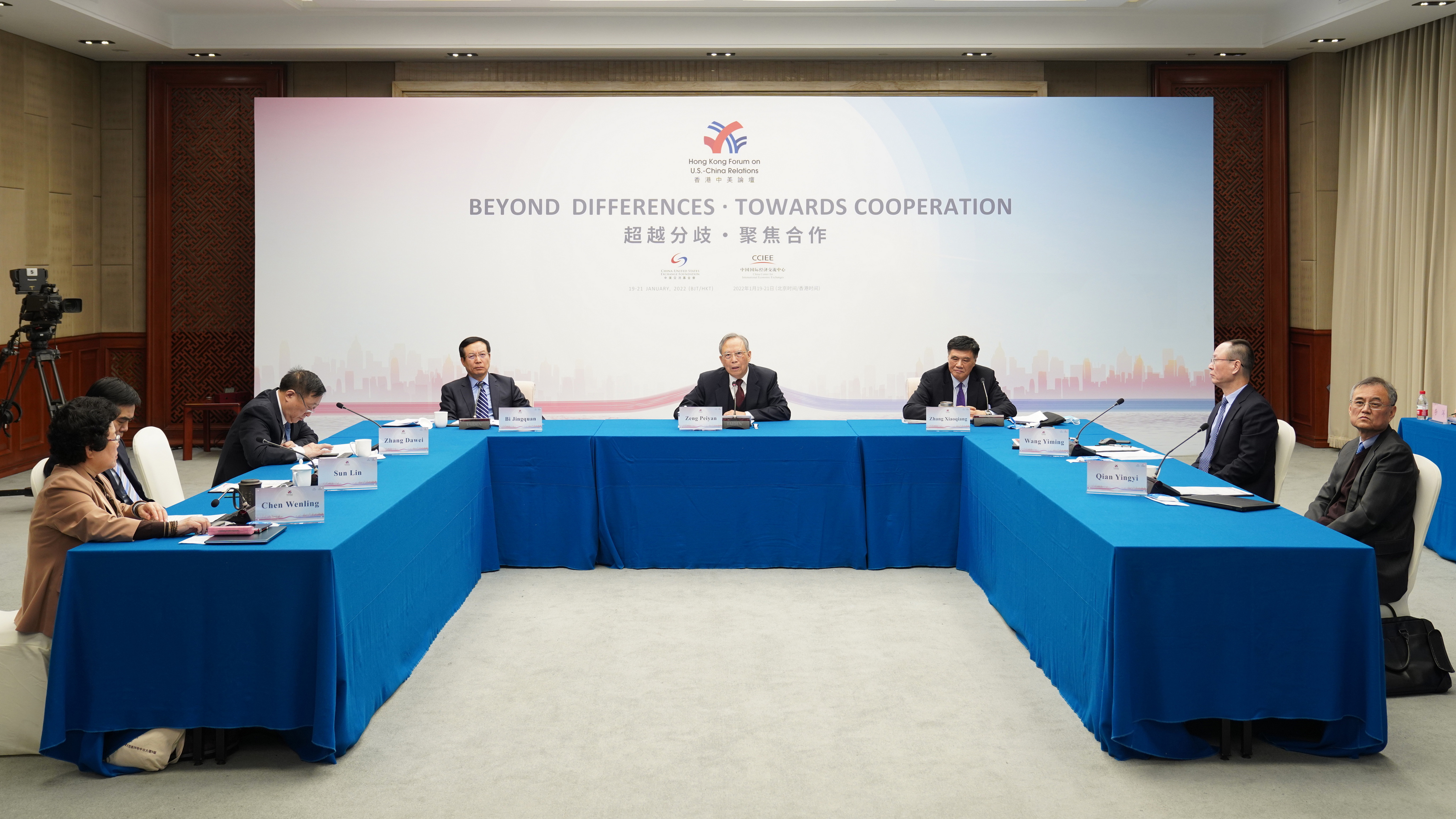Hong Kong Forum on China-U.S. Relations 2022 Is Held Online
- Time:2022-01-21
- source:CCIEE
From 19 to 21 January 2022, China Center for International Economic Exchanges (CCIEE) and China-United States Exchange Foundation (CUSEF) co-organized the third Hong Kong Forum on China-U.S. Relations, which was themed with “Beyond Differences, Towards Cooperation”, through virtual approach. Participants carried out sufficient and in-depth discussions and exchanges on issues concerning China-U.S. relations, such as challenges and restrictions, recovery of global economy, trade and investment, global supply chain, climate change and people-to-people exchanges. Victor Fung, Group Chairman of Fung Group, made the welcoming remarks. Jean Chrétien, Former Canadian Prime Minister, Yasuo Fukuda, Former Japanese Prime Minister, Goh Chok Tong, Emeritus Senior Minister and Former Prime Minister of Singapore, Mary Robinson, Former President of Ireland and UN Former High Commissioner for Human Rights, Steve Orlins, President of the National Committee on U.S.–China Relations and Zeng Peiyan, Former Vice Premier of the State Council of China, delivered keynote speeches respectively. More than 150 former senior officials, business leaders and well-known scholars from different countries, such as the U.S. and New Zealand, attended the Forum.

Chinese delegates deemed that against the backdrop of changes unseen in a century and the COVID-19 pandemic at present, the recovery of world economy is winding and tortuous while the pressure of inflation and financial risk is going up. The resurgence of the pandemic adds uncertainty to world economy. As the most important bilateral relationship in the world, China-U.S. relations have been undergoing the most difficult period in recent years, running off the normal track. Maintaining stable China-U.S. relations is not only of importance to both countries, but also an expectation shared by countries around the world. On 16 November 2020, heads of the state of the two countries held video conference for the first time, carrying out sufficient and in-depth communications and exchanges on issues that are strategic, full-pictured, fundamental, and related to the development of bilateral relations, and questions of both concerns. Chinese president Xi Jinping concluded the experience and lessons from the China-U.S. relations in the past and put forward three directive principles in developing the relations for the new era, namely mutual respect, peaceful coexistence and win-win cooperation.
Chinese delegates viewed that mutual respect is the premise of development China-U.S. relations. The two countries should respect each other’s social system and development path, core interests and major concerns, right for development and equal status. Peaceful coexistence is the foundation of bilateral relations. With peace and development being the mainstream of the times, China is always a builder of world peace, a contributor to the global development, a keeper of international order and a provider of public products. China and the U.S. should strengthen communications, exchanges and dialogues at different levels, enhance mutual understanding and trust, and avoid strategically erroneous judgement, insisting to the bottom line of non-conflict and non-confrontation. Win-win cooperation is the goal of developing China-U.S. relations. Nowadays, China and the U.S. have extensive common interests in bilateral and global affairs and should prioritize cooperation on fighting the pandemic, addressing climate change, economics and trade, technology and global governance, transforming potential for cooperation to driver of growth.
Foreign delegates agreed that as two major powers, China and the U.S. should shoulder international responsibility and duty together, making historical contributions to the peace and development of the world. The two countries should launch dialogues in a proactive manner, intensify pragmatic cooperation on climate change, facilitate recovery of world economy with joint efforts, and solve the prominent problems caused by the pandemic, such as the break of supply chain. In face with mutated and resurged COVID-19 virus, China and the U.S. should continue to boost technological cooperation on the fight against the pandemic, promote the fair distribution of vaccines worldwide, and contribute to the global victory of combating the pandemic as soon as possible. The two countries should endeavor to set up bilateral relations based on frankness and honesty, avoid mutual threat and conflict, and find a new mode in which the bilateral relations can be improved and developed peacefully with common wits.
